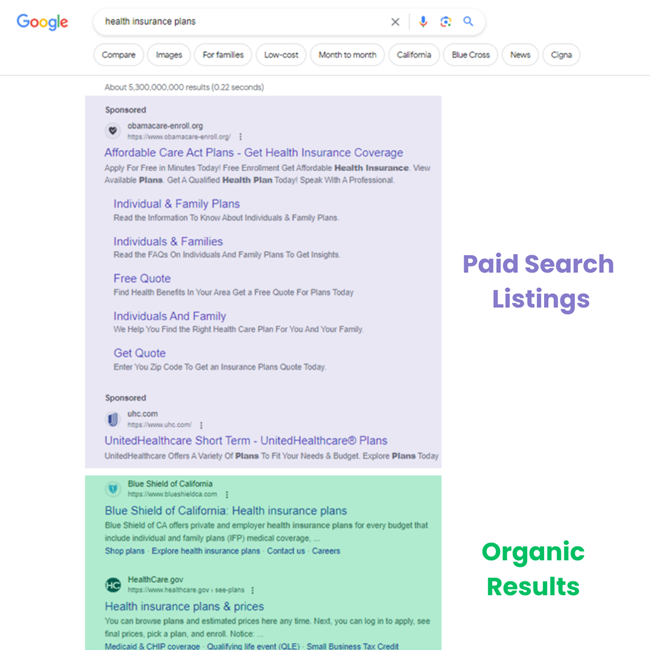7 Tips for Insurance Agents to Start Paid Search Marketing

Paid search is a powerful marketing channel for a wide variety of industries. For those unfamiliar with the concept, let’s answer a relatively common question folks new to digital marketing principles may have.
What is Paid Search?
Paid search (or Search Engine Marketing) is the process of placing ads in search engines based on a user’s keyword search query. Unlike its organic search listing counterpart, paid search requires companies/advertisers to pay an associated cost per click for every click an ad receives. Another key differentiator between paid search and organic search is that paid search is not driven by organic algorithms but rather a bidding and ad quality score that determine how prominently an ad will display.
In this blog post, we provide seven surefire tips to empower insurance agencies with the knowledge to harness the power of paid search for lead generation success.
1. Start with Keyword Research: The Foundation of Paid Search
Embarking on a paid search campaign without thorough keyword research is like to setting sail without a compass. Insurance brokers must delve deep into understanding the specific terms and phrases their potential clients are using to seek insurance solutions. Tools like Google Keyword Planner or SEM Rush provide invaluable insights into search volumes, competition levels, and related queries - enabling agents to craft campaigns that resonate with their target audience's needs and preferences.
You can also check our previous post on keyword research strategies for some additional tips into mastering your keyword mix. A key best practice to remember when setting up your keyword targets is to only bid for keywords that show clear transaction or lead generation intent. For example, “cost of health insurance plans” vs. “what is a health insurance plan”?
2. Crafting Compelling Ad Copy: The Art of Persuasion
The essence of a successful paid search campaign lies in the ability to persuade with brevity. Insurance agents must hone their skills in crafting ad copy that succinctly encapsulates the value proposition of their offerings. Highlighting unique benefits, incorporating action-oriented language, and addressing the searcher's intent are critical components of ad copy that converts interest into action.
3. Leveraging Ad Extensions: Enhancing Visibility and Information
Ad extensions are powerful tools that allow agents to expand their ad with additional information, making it more appealing and informative to potential clients. From location extensions that guide prospects to local offices to call extensions that facilitate immediate communication, these features significantly increase the chances of conversion by providing searchers with multiple avenues to engage with the agent's services.
4. Optimizing Landing Pages: The Key to Conversions
The journey from click to client hinges on the effectiveness of the landing page. An optimized landing page must offer a seamless user experience, with clear messaging that aligns with the ad copy, straightforward navigation, and a compelling call-to-action (CTA). Ensuring mobile responsiveness and fast loading times are also paramount, as they directly impact engagement and conversion rates.
5. Geo-targeting: Capturing Local Leads
For many insurance agents, the local market represents a fertile ground for lead generation. Geo-targeting enables agents to tailor their paid search campaigns to specific geographical areas, ensuring that their ads reach the prospects most likely to convert. This localized approach not only increases relevance but also reduces competition and cost-per-click (CPC) rates.
6. Utilizing Negative Keywords: Refining Campaign Focus
Negative keywords are a strategic asset in refining campaign focus and eliminating irrelevant traffic. By identifying and excluding terms that are unrelated to the services offered, agents can ensure that their ad spend is directed toward prospects with genuine interest, thereby enhancing the efficiency and effectiveness of their paid search campaigns. Some common negative keywords for health insurance agencies to exclude in targeting would be “auto,” “home,” and “car.” in the case that your agency does not operate in the Property and Casualty space.
7. Continuous Testing and Optimization: The Path to Perfection
The realm of paid search is characterized by constant evolution, necessitating a commitment to ongoing testing and optimization. A/B testing of ad copy, experimenting with different keywords, and adjusting bidding strategies are integral processes that enable agents to fine-tune their campaigns for optimal performance. Monitoring metrics such as click-through rate (CTR), conversion rate, and quality score provide actionable insights that guide these refinements.
In conclusion, embracing paid search as a cornerstone of lead generation requires insurance agents to embark on a journey of continuous learning and adaptation. By implementing these seven strategies, agents can unlock the full potential of paid search, driving targeted leads that translate into sustained growth and success in the competitive insurance landscape.
Top of Form
About the Author
Kalup Alexander is Digital Marketing Director for The Word & Brown Companies. He holds a Bachelor of Arts degree in New Media Communications and Marketing from Oregon State University and has been at Word & Brown since 2014.

